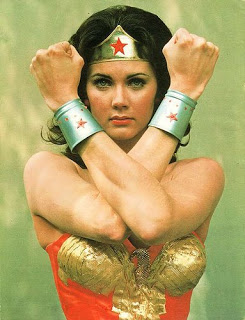
Like a lot of women I know, superhero movies don’t really thrill me.
It wasn’t always this way. I have a clear memory of parading through the classrooms of my elementary school, when I was in fourth grade, dressed as Batman. I remember clearly that I felt powerful—not just because I was the Caped Crusader, but because my peers couldn’t tell if I was a boy or a girl.
Fast forward twenty years, when I enjoyed Batman Begins and looked forward to seeing what Maggie Gyllenahall would do for the role Katie Holmes tiptoed through. Turns out that Ms. Holmes wasn’t the problem with Rachel Dawes–Rachel Dawes was.
Although I had She-Ra action figures as a child, He-Man and Batman proved much more influential. While my childhood proclivities may be more revealing of my own personality than evidence of a lack of strong female characters, as an adult looking at representations of super-human power in the media, it’s more of a man’s world than ever.
Alyssa Rosenberg takes on the issue of female superheroes in the age of testosterone-fueled CGI blockbusters in her superb article “The Invisible Woman,” published this past September in The American Prospect. She talks of how comic books have numerous strong female characters—and a strong, growing female readership—but how Hollywood can’t seem to follow suit.
After a summer during which women flexed their box-office muscle, giving Sex and the City the highest-grossing opening for an R-rated comedy in movie history, it’s not inconceivable to think that a superheroine flick could draw on both the “girls’ night out” crowd and the already broad fan base for comic-book movies. That would be a great development, and not just for the studios that would experience a revenue bump of the kind provided by the Spider-Man and X-Men franchises. Superheroine movies could instantly provide badly needed quality roles for talented female actresses of varying ages and ethnicities, helping to address a gender imbalance in summer movies that’s caused critics like The New York Times’ Manohla Dargis (herself a minority in a world of mostly male reviewers) some serious heartburn.
Here’s hoping 2009 might bring some super-heroines whose shoes and sexuality aren’t her defining features.
